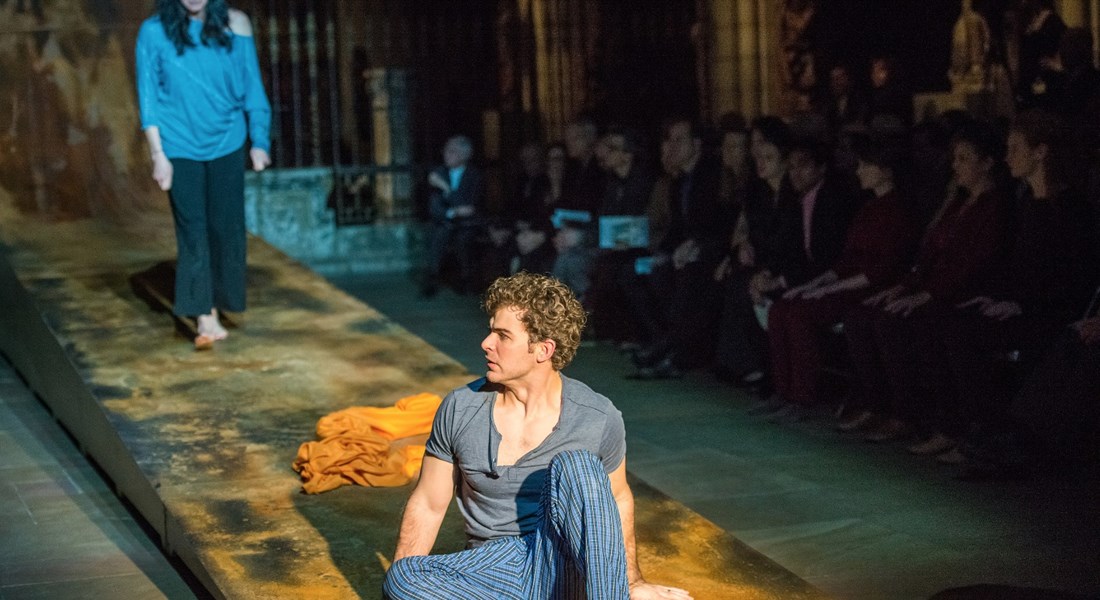Posted27 Mar 2017
- In
Hannah Moscovitch Talks TV Writing, Opera, and Their Many Similarities
Throughout March, the Opera Philadelphia blog hosts a celebration of Women’s History Month, shining the spotlight on the women creating opera today. Just tuning in? Check out an interview with War Stories director Robin Guarino; a guest post from Breaking the Waves composer Missy Mazzoli on the contemporary composers who inspire her; and our own Elizabeth Braden on her evolution from singer to Chorus Master and conductor. Next up: I Have No Stories To Tell You librettist Hannah Moscovitch reveals how writing for TV influenced her opera writing.
Wednesday morning of last week I was on a Skype call with composer Lembit Beecher. I wrote the libretto for one of Lembit’s operas, I Have No Stories to Tell You, in 2014, and now we’re working on two more together. In the afternoon, I worked on two episodes of a TV show called Five Eyes—a dystopic espionage drama—that’s in development at Rhombus Media. In the evening, I went and saw a run of a theatre project of mine, called What a Young Wife Ought to Know, set in the 1920s, pre-birth control. The show was about to leave on a West Coast tour and I wanted to see how my rewrites were working out.
I started out as a playwright, but for many years now I’ve written in multiple mediums. I’ve built a strange and whimsical career out of switching between TV, opera, and theatre work (I’ve written radio dramas, films and essays as well, though less consistently). Among other things, it’s made me aware that the way in which the act of writing is viewed shifts with the medium. In TV writing rooms, for instance, there’s a sense that writing is a technical skill, acquired through experience, while in theatre it’s regarded as a quasi-mystical calling. Both are probably true. And the style of writing that’s required—what’s considered to be “good writing”—is also medium-dependent.
It’s counterintuitive I know, but I’ve found that writing for opera has most in common with working on a TV show. And I think it’s primarily my experience as a TV writer that helped me find my way in opera. Most obvious similarity: both TV and opera require a minimalism on the part of the writer, pared down language that communicates huge thoughts and emotions with limited words. When writing TV, I leave space for image to communicate: the close up on an actor will give the audience so much story information that I don’t need to put language around the moment. When I’m writing for opera, the space I leave is for the music.
Much like TV writing, opera requires collaboration at the initial, generative stages of work. When I write plays I do collaborate, but not until I’m a few drafts in. Mine is the sole authorial voice, and the process of designing the piece is fused to the process of executing it. I write it in order to know what it is. Not so in TV, where the design of the writing happens collaboratively (or competitively, depending on the room). The essential content of the episodes I write—theme, structure, character—is decided in a room of writers by pitching story ideas out loud. If your background is in playwriting, it’s a foreign system and the learning curve is steep. I had to work out how to divide out the process of having an idea from the act of writing the idea. And I had to work out how to muscle my chaotic writing impulses into fully formed ideas and then how to speak persuasively about those ideas in a room full of people. Those are the same skills I’ve needed when working with composers. Generating. Describing. Convincing. All before the process of drafting begins.

The type of stories being told in opera and TV are changing radically these days, so this generalization is already dated. But in the past, both mediums have lent themselves to big stories. To the epic and the melodramatic. To tragedy and romance and betrayal writ large. When I write theatre, it can feel like portraiture compared with the brassier narratives of TV and opera. Shakespeare and his contemporaries did big stories but our pathos and our naturalism meters have shifted since his time. Extreme stories can seem stupid on stage these days; they can seem “too much.” They ring false. Watching an actor pretend to be murdered onstage in a play can pull you out of the experience. Where is the blood? Why is the actor still breathing? TV and opera are bigger canvasses. Murder works great. “Too much” works great.
While I’ve been typing this blog, Lembit has decided what the title of our latest opera will be. He just sent it to me in an email. It’s so wonderful that in opera I don’t have to be responsible for thinking up the title!
Leave your comment below.

 Facebook
Facebook Twitter
Twitter More
More